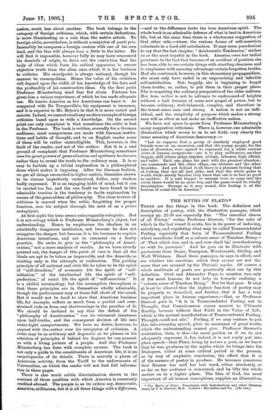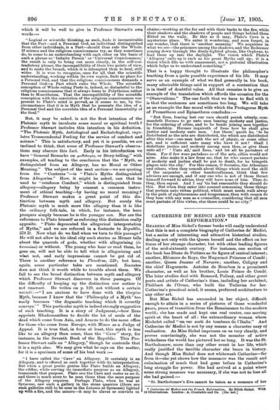THERE are fine things in this book. The definition and
description of poetry, with the illustrative passages, which occupy pp. 22-39 are especially fine. " The essential charm of all Poetry," writes Professor Stewart, "for the sake of which in the last resort it exists, lies in its power of inducing, satisfying, and regulating what may be called Transcendental Feeling, especially that form of Transcendental Feeling which manifests itself as a solemn sense of Timeless Being— of That which was, and is, and ever shall be,' overshadowing us with its presence." And he goes on to illustrate with quotations from Dante, Tennyson, Wordsworth, Shelley, and Walt Whitman. Read these passages, he says in effect, and see whether the emotions which they arouse are not the same that are aroused by the Platonic myths. Of course a whole multitude of poets are practically shut out by this definition. Ovid and Alexander Popo, to mention two only of the most famous, do not help us towards realising a " solemn sense of Timeless Being." But let that pass. It may at least be allowed that the highest function of poetry may be properly so described, and further, that it has a very important place in human experience,—that, as Professor Stewart puts it, " it is in Transcendental Feeling, not in Thought, that Consciousness comes nearest to Ultimate Reality, because without that Faith in the Value of Life, which is the normal manifestation of Transcendental Feeling, Thought could not stir." Feeling, if we may venture to put this into everyday speech, gives us assurance of great truths which the understanding cannot give. Professor Stewart's contention, then, is this—he must pardon us if we do not adequately represent it, for, indeed, it is not easily put into plain speech—that Plato, being by nature a poet, as we know that he was, produces by the myths which he brings into his Dialogues, either at some critical period in the process, or by way of emphatic conclusion, the effect that it is of the essence of poetry to produce. He becomes conscious that Reason has said her last word, either absolutely or as far as her audience is concerned, and he lifts the whole matter on to a higher plane. The Idea of God, the most important of all human conceptions, supplies an illustration, • The Myths of Plato. Translated, with Introductory and other Observa- tions, by J. A. Stewart, M.A. London : Macmillan and Co. [Ms. net.]
which it will be well to give in Professor Stewart's own words :— "Logical or scientific thinking, as such, finds it inconceivable that the Part—and a Personal God, an individual distinguished from other individuals, is a Part—should thus rule the Whole. If science and the religious consciousness try, as they sometimes do, to come to an understanding with each other on the basis of such a phrase as Infinite Person' or 'Universal Consciousness,' the result is only to bring out more clearly, in the self-con- tradictory phrase, the incompatibility of their two points of view, and to make the breach, which it is attempted thus to heal, still wider. It is wise to recognise, once for all, that the scientific understanding, working within its own region, finds no place for a Personal God, and that the religious consciousness demands a Personal God—a Part which rules the Whole. The scientific conception of Whole ruling Parts is, indeed, so distasteful to the religions consciousness that it always leans to Polytheism rather than to Monotheism. That the incompatibility of the scientific conception with the conviction of the religious consciousness was present to Plato's mind is proved, as it seems to me, by the circumstance that it is in Myth that he presents the idea of a Personal God and the correlate idea of a Personal Immortality of the Soul."
But, it may be asked, is not the first intention of the Platonic myth to inculcate some moral or spiritual truth ?
Professor Stewart includes this intention in his definition. " The Platonic Myth, Aetiological and Eschatological, regu-
lates Transcendental Feeling for the service of conduct and science." This is satisfactory, and yet it is possible, we are inclined to think, that some of Professor Stewart's observa- tions may obscure this fact. Early in his introduction we have " General Remarks on naloXoyia, or Story-telling," with examples, all tending to the conclusion that the " Myth, as distinguished from an Allegory, has no Moral or Other Meaning." The subject of the next section—we are quoting
from the " Contents "—is " Plato's Myths distinguished from Allegories." How, it might he asked, can that be used to " reinforce Conduct," which is distinguished from allegory—allegory being by consent a common instru- ment of ethical teaching—by having no moral meaning ? Professor Stewart makes a great point of this dis- tinction between myth and allegory. But surely the Platonic myth is much more like allegory than it is like the ordinary folk-tale, in which, for instance, the hero prospers simply because he is the younger son. Nor are the references to Plato himself as enforcing this distinction really apposite. " Plato deprecated the allegorical interpretation
of Myths," and we are referred in a footnote to Republic, 378 D. Now what do we find when we turn to this passage P
He will not allow in his ideal city such stories as Homer tells about the quarrels of gods, whether with allegorising (iv 6rrovoiau) or without. The young who hear or read them, he goes on, will not be able to tell what is allegorising and what not, and early impressions cannot be got rid of. There is another reference to Phaedrus, 229; but here, again, some particular tales are mentioned. Socrates does not think it worth while to trouble about them. We tail to see the broad distinction between myth and allegory which Professor Stewart discovers in these passages. Of the difficulty of keeping up the distinction our author is not unaware. He writes on p. 129, not without a certain
naivete :—" I am anxious to have done with the Gorgias Myth, because I know that the 'Philosophy of a Myth' too easily becomes 'the dogmatic teaching which it covertly conveys.' " This particular myth is indeed strongly suggestive of such teaching. It is a story of Judgment,—how Zeus appoints Rhadamanthus to decide the lot of souls of the dead which come from Asia, and Aeacus to do the same office for those who come from Europe, with Minos as a Judge of Appeal. It is true that, in form at least, this myth is less like to an allegory than some, than the " Cave " story, for instance, in the Seventh Book of the Republic. This Pro- fessor Stewart calls an " Allegory," though he contends that it is a myth also. We may give what he says on the matter, for it is a specimen of some of his best work :— " I have called the ' Cave' an Allegory. It certainly is an Allegory, and is offered as such together with its interpretation. But when a great poetic genius like Plato builds an Allegory, the edifice, while serving its immediate purpose as an Allegory, transcends that purpose. •Plato sees the Cave and makes us see it, and there is much more to be seen there than the mere purpose of the Allegory requires. Perhaps Plato, when he was at Syracuse, saw such a gallery in the stone quarries (there are such galleries still to be seen in the ',atomic at Syracuse) lighted up with a fire, and the miners—it may be slaves or convicts in chains:—working at the far end with their backs to the fire, while their shadows and the shadows of people and things behind them flitted on the walls. Be this as it may, Plato's Cave is a mysterious place. We enter it wondering, and soon forget, in our wonder, that there is 'another meaning.' We acquiesce in what we see—the prisoners among the shadows, and the Redeemer coming down through the dimly-lighted gloom, like Orpheus, to lead them up into the daylight. The vision which Plato's 'Allegory' calls up is such as his great Myths call up; it is a vision which fills us with amazement, not a pictorial illustration which helps us to understand something."
That is a happy thought to illustrate the philosopher's teaching from a quite possible experience of his life. It may serve as an example of what we find generally in his book, many admirable things said in support of a contention that is in itself of doubtful value. All that remains is to give an example of the translation which affords the occasion for the " Observations." The one fault that we have to find with it is that the sentences are sometimes too long. We will take as an example the fine moral with which the Protagoras Myth of Prometheus and Epimetheus concludes :- " But Zeus, fearing lest our race should perish utterly, com- mandeth Hermes to go unto men bearing modesty and justice, for the ordering of cities, and to be bonds joining men together in friendship. Hermes inquireth of Zeus how he shall give justice and modesty unto men. ' Are these,' quoth he, 'to be distributed as the arts are distributed, the which are distributed after this wise—one man hath the art of physic, or some other art, and is sufficient unto many who have it not ? Shall I distribute justice and modesty among men thus, or give them unto all ? " Unto all,' said Zeus, and let all be partakers of them. For if few were partakers as of the arts, cities would not arise. Also make it a law from me, that he who cannot partake of modesty and justice shall be put to death, for he bringeth plague into the city.' For this reason, 0 Socrates, the Athenians and others, when they consult about things which need the skill of the carpenter or other handicraftsman, think that few advisers are enough, and if any one who is not of those thrust himself forward to advise, they will have none of him. Thus do they, thou sayest. And I say 'tis but reasonable they should do this. But when they enter into counsel concerning those things that pertain unto virtue political, which must needs walk alway in the path of righteousness and temperance, then with reason do they bear with any man as a counsellor, considering that all men must partake of this virtue, else there could be no city."







































 Previous page
Previous page